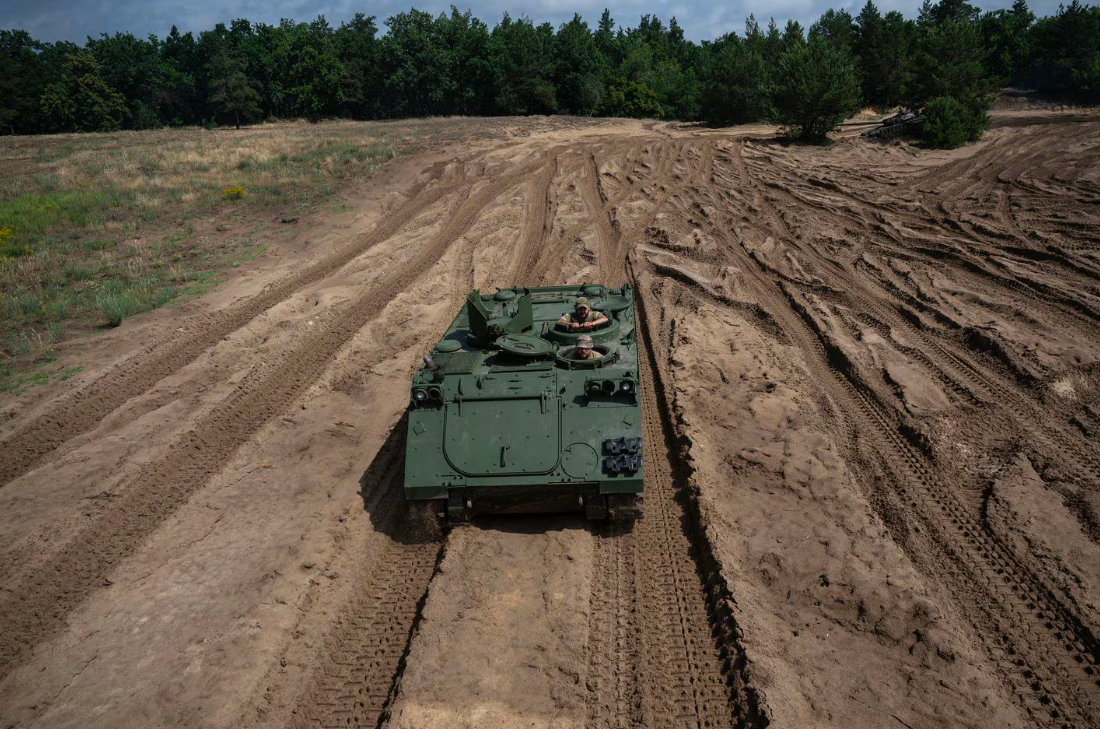80 多个国家支持谈判,为乌克兰铺平和平之路

【中美创新时报2024 年 6 月 17 日编译讯】(记者温友平编译)在瑞士举行的为期两天的峰会上,数十个国家周日与乌克兰一道呼吁“各方对话”以结束与俄罗斯的战争。但乌克兰总统弗拉基米尔·泽连斯基表示,他坚决反对任何可能导致该国割让领土的谈判。《纽约时报》记者安东·特罗伊亚诺夫斯基(Anton Troianovski )对此作了下述报道。
上周末举行的峰会吸引了来自约 90 个国家的政要来到瑞士阿尔卑斯山度假胜地;俄罗斯没有受到邀请,因此中国和巴西拒绝参加。
会议结束时,大多数代表团签署了一份共同原则声明,包括促进囚犯交换和核安全。
他们还表示,要继续推进,就需要“各方代表进一步参与”,这种含糊的表述凸显了各方对此次会议面临的最大问题缺乏共识:乌克兰和俄罗斯应何时以及如何寻求和平谈判?
两国已陷入全面战争的第三年,双方都没有明确的军事胜利之路,一些世界领导人呼吁交战双方进行谈判和妥协。印度、沙特阿拉伯、南非、土耳其等国家在峰会上重申了这一信息。
但泽连斯基长期以来一直认为,只有俄罗斯全面撤军,才能实现乌克兰的持久和平。他周日告诉记者,一旦国际社会在峰会结论的基础上制定了和平计划,“那么这项批准的计划将转交给俄罗斯联邦代表。”
“然后,”他补充道,“我们会看看他们是否准备好结束战争。”
当被问及谈判前景时,他说,“如果俄罗斯离开我们的合法领土,它明天就可以开始与我们谈判,无需等待。”
对于乌克兰来说,此次峰会对于推动泽连斯基结束冲突的愿景具有重要意义,该愿景还包括对俄罗斯战争罪行进行赔偿和正义审判。
“俄罗斯联邦与乌克兰的持续战争继续造成大规模的人类苦难和破坏,并带来具有全球影响的风险和危机,”会议联合声明称,瑞士表示该声明得到了 80 多个国家的认可。
但印度、墨西哥、沙特阿拉伯、南非和阿拉伯联合酋长国是少数拒绝签署的国家之一。印度高级外交官帕万·卡普尔表示,他的国家不认可该声明,因为“只有双方都能接受的选择才能带来持久的和平。”
南非批评峰会将以色列纳入其中,并呼吁加大俄乌谈判力度。(南非在国际法院指控以色列犯下种族灭绝罪,以色列称此举“卑鄙无耻”。)
南非总统国家安全顾问悉尼·穆法马迪在一份声明中表示:“我们的行动不应排除俄罗斯和乌克兰找到谈判桌的可能性。”
乌克兰的西方盟友几乎没有谈及与俄罗斯进行和平谈判的可能性。欧盟执行委员会主席乌尔苏拉·冯德莱恩表示,俄罗斯只有表示致力于遵守包括领土完整在内的联合国原则,才能成为“将和平之路带到目的地的努力的一部分”。
瑞士总统维奥拉·阿姆赫德说:“还有一个关键问题:俄罗斯如何以及何时才能参与这一进程?”“过去两天的讨论表明,双方存在不同的观点。”
瑞士官员表示,未来的发展方向可能是与俄罗斯就峰会上讨论的具体优先事项建立接触,包括确保黑海航运安全和释放战俘。
乌克兰的主要盟友美国派副总统卡马拉·哈里斯出席了峰会,她在第一天会议结束后于周六晚上离开。周日,拜登总统的国家安全顾问杰克·沙利文告诉代表们,峰会为未来的谈判奠定了基础,但没有详细说明谈判何时或如何进行。
他说,此类会谈将以各国对《联合国宪章》中概述的“主权和领土完整概念”的认可为基础。
“这为乌克兰提供了一个平台,乌克兰可以在此基础上继续前进,以信任的立场进行谈判,以确保其主权和领土完整,”沙利文说。
为了结束战争,外交支持可以加强乌克兰在最终和平谈判中的地位。但战场上的进展肯定会影响任何解决方案。
今年冬天开始的俄罗斯攻势有逐渐减弱的迹象。它最多将前线移动了约 15 英里,移到了乌克兰东部顿巴斯地区阿夫迪夫卡镇以西。
在乌克兰方面,美国的弹药和武器正在帮助扭转局势。在国会数月未批准援助后,援助已经开始抵达战场。乌克兰预计将于本月或下个月接收首批 F-16 战机,但随着飞行员掌握了飞机的战斗技能,这些战机只会逐渐改善乌克兰的军事前景。
泽连斯基表示,他将继续推动外交努力,为第二次峰会做准备,届时将向俄罗斯提交一份和平计划。他说,乌克兰已经在与表示有兴趣主办此类会议的国家进行谈判。
但俄罗斯几乎没有表现出参与泽连斯基外交路线的意愿。克里姆林宫发言人德米特里·佩斯科夫在周日播出的电视采访中驳斥了这次峰会,称“他们不会谈论和平”。
本文最初发表于《纽约时报》。
题图:6 月 11 日,乌克兰士兵在乌克兰国民警卫队训练中心练习驾驶美国 M113 坦克。LYNSEY ADDARIO/NYT
附原英文报道:
More than 80 nations back talks to ease path to peace in Ukraine
By Anton Troianovski New York Times,Updated June 16, 2024
OBBURGEN, Switzerland — Scores of countries at a two-day summit in Switzerland joined Ukraine on Sunday in calling for “dialogue between all parties” to end the war with Russia. But Ukraine’s president, Volodymyr Zelensky, said he remained steadfast in opposing any negotiations that could require his country to cede territory.
The summit over the weekend drew dignitaries from about 90 countries to a Swiss Alpine resort; Russia was not invited and, because of that, China and Brazil declined to participate.
At the end of the meeting, most of the delegations signed on to a statement of shared principles including promoting prisoner exchanges and nuclear safety.
They also said that “further engagement of the representatives of all parties” was necessary to proceed, a vague formulation underscoring the lack of common ground on the biggest question hanging over the gathering: When, and how, should Ukraine and Russia seek to negotiate peace?
With the two countries locked in their third year of all-out war and with no clear path to military victory for either, some world leaders are calling for negotiations and compromise between the warring sides. India, Saudi Arabia, South Africa, Turkey, and others repeated that message at the summit.
But Zelensky has long argued that a lasting peace in Ukraine can be achieved only with Russia’s full withdrawal. He told reporters Sunday that once the international community formulated a peace plan, building on the conclusions of the summit, “then this approved plan will be passed to representatives of the Russian Federation.”
“And then,” he added, “we’ll see if they are ready to end the war.”
Asked about prospects for talks, he said, “Russia can start negotiations with us tomorrow without waiting for anything if it leaves our legitimate territories.”
For Ukraine, which asked Switzerland to be the host of the summit and worked to bring as many world leaders as possible to it, the event was important for building global momentum behind Zelensky’s vision for ending the conflict, which also includes reparations and justice for Russian war crimes.
“The ongoing war of the Russian Federation against Ukraine continues to cause large-scale human suffering and destruction and to create risks and crises with global repercussions,” according to the conference’s joint statement, which Switzerland said was endorsed by more than 80 countries.
But India, Mexico, Saudi Arabia, South Africa, and the United Arab Emirates were among the handful of countries that declined to sign. A senior Indian diplomat, Pavan Kapoor, said his country did not endorse the statement because “only those options acceptable to both parties can lead to abiding peace.”
South Africa criticized the summit for including Israel and called for a greater push for negotiations between Russia and Ukraine. (South Africa has accused Israel of genocide in the International Court of Justice, a move that Israel has called “despicable.”)
“Our actions should not foreclose the possibility of Russia and Ukraine finding their way to the negotiating table,” Sydney Mufamadi, the national security adviser to South Africa’s president, said in a statement.
Ukraine’s Western allies have said little about possible peace talks with Russia. Ursula von der Leyen, the president of the European Union’s executive branch, said Russia could become “part of efforts to bring the path to peace to its destination” only if it said it was committed to United Nations principles including territorial integrity.
“One key question remains: How and when can Russia be included in the process?” said Viola Amherd, the Swiss president. “The discussions over the past two days have shown that there are different points of view.”
Swiss officials said the way forward could be to build engagement with Russia on the specific priorities discussed at the summit, including ensuring safe shipping in the Black Sea and the release of prisoners of war.
Ukraine’s main ally, the United States, was represented at the summit by Vice President Kamala Harris, who left Saturday evening after the first day. On Sunday, President Biden’s national security adviser, Jake Sullivan, told the delegates that the summit had set the stage for future negotiations, without elaborating on when or how they might happen.
Such talks, he said, would build on the gathered nations’ endorsement of “the notion of sovereignty and territorial integrity” outlined in the United Nations Charter.
“That has created a platform upon which Ukraine can stand, going forward, to negotiate from a position of confidence to secure its sovereignty and territorial integrity,” Sullivan said.
To end the war, diplomatic backing could strengthen Ukraine’s hand in eventual peace talks. But developments on the battlefield would be sure to shape any settlement.
A Russian offensive that began over the winter has shown signs of petering out. It shifted the front line at most by about 15 miles, to the west of the town of Avdiivka, in the Donbas region of eastern Ukraine.
On the Ukrainian side, American ammunition and weaponry are helping to shift the tide. After months of delay by Congress in approving aid, it has begun to arrive on the battlefield. Ukraine is expected to receive its first F-16 jets this month or next, though they will improve its military’s prospects only gradually, as pilots gain combat skills in the aircraft.
Zelensky said he would continue his diplomatic push in order to prepare for a second summit at which a peace plan could be presented to Russia. He said Ukraine was already in talks with countries that had indicated an interest in hosting such a meeting.
But Russia has shown little inclination to engage with Zelensky’s diplomatic track. The Kremlin’s spokesperson, Dmitry Peskov, dismissed the summit in a television interview broadcast Sunday, saying that “they’re not going to be talking about peace.”
This article originally appeared in The New York Times.

